David Oistrakh (EMI Classic Archive 01)
Introduction
There are few instrumental soloists who people admire as much as David Oistrakh. He is one of those artists for whom just the surname is sufficient (although those who want to try and be clever always ask whether they mean him or his son, Igor) . Composers such as Shostakovitch and Khachaturian wrote major works for him, and he was in demand the world over, when finally allowed out of the Soviet Union, to play a huge variety of repertoire on one of the seven Strads he often 'borrowed' from the Soviet state.
It wasn't always plain-sailing of course. Being born into a Jewish family had its drawbacks, as did losing a major violin competition to a sixteen year old girl - who happened to be Ginette Neveu, a child prodigy who died tragically in a plane crash aged only 30. He did however get involved in the Soviet war effort, not by fighting but by entertaining the troops and citizens, perhaps most famously when he performed the Tchaikovsky concerto to the end in Stalingrad during a major bombardment by the Nazis.
Here, in the first of a growing series of DVDs from EMI, he is shown in what may appear at first glance to be a bit of a mish-mash of a programme, with only two major works played in full, but at least it gives a tantalising glimpse of the sheer musicality of the man, despite the age and state of the recorded material.
Audio
The quality of each recording varies, and despite some obvious remastering, still suffers from age. Having said that, nothing is 'unlistenable' and when we have violin and piano only, the clarity is often quite remarkable (as many mono recordings are).
Video
Again, it's a very mixed bag. The recording of the Bach concerto (from London in 1961) suffers most, but this is often the case with aged TV recordings, and despite some glare from the TV lights in most of the performances, the picture qulaity is satisfactory.
Extras
If you can count it as an extra, the 'bonus' performance is the third movement of the Brahms concerto. Why it isn't just down as part of the main programme is anyone's guess. In fact, the whole work would have been welcome, but I suppose we should be grateful for small mercies.
The accompanying booklet contains a short essay on the disc contents by Tully Potter, who is quite honest about his feelings towards Oistrakh's playing, although I can't agree with everything said, but more of that later.
Conclusion
As I mentioned earlier, this is a bit of a mixed bag. When it is good, it is very, very, good..but when it isn't, it's a little disappointing. I'm speaking mainly about the performance of the Bach concerto, which struck me more as an interesting curiosity about how Baroque music was often played at the time, rather than a dramatic insight into how it should be played.
Full of great 'Brahmsian' vibrato and little variation in dynamics, there's a huge amount of passion and power, all of which comes to nought as there's very litle life to the whole thing. Tully Potter mentions Emanuel 'Manny' Hurwitz's (leading the ECO in this performance) comments about Oistrakh's 'classical' style of playing, yet then goes on about his relying on his "superb left hand for much of the articulation" rather than the bow. All well and good, but surely the left hand, used in such a way, prevents decent articulation, however 'long' the bowing action is?
I think that an increasing awareness regarding 'authentic' baroque styles in the 38 years since this recording places comments such as this firmly on the scrapheap.
The rest of the programme is more succesful, as we see Oistrakh (mostly) in a more intimate environment, with just himself and a piano (or violin) as a partner.
It's a shame that the Schubert Sonata, Brahms Scherzo, and Prokofiev Sonata are shown as single movements, as the works themselves suffer (albeit in a Classic FM manner) despite the musicianship shown thoughout. It's a particularly impressive show when Oistrakh is joined by his long-term accompanist, Lev Oborin, as here we can see what can be achieved when a duo trust each other implicitly, especially in the 'Spring' sonata, which is definitely the highlight of the set.
Frida Bauer is also a fine partner in the Prokofiev 'Melodies', but has little to do in the rather saccharine arrangement of the famous Debussy piano work 'Clair de lune', but which is played beautifully all the same.
The single movement of the Prokofiev Sonata shows what a great team father and son made when playing together. The two quite distinct sounds, and playing styles, are a perfect match for the composer's complex melodic lines, and the concentration displayed by both is great to see.
The Brahms concerto was one of Oistrakh's showpieces, and despite only having the Finale on show here, there's still a huge amount to enjoy, not least the almost casual way he finds his way around the instrument during the more technically challenging passages (not that there's much which isn't in this movement).
Rudolf Schwarz appears as a rather dour figure during the proceedings but whips up a great performance from the BBC SO, in what surprised me as a being recorded in front of an audience (who are unseen throughout) as much of Oistrakh's playing is directed towards the orchestra.
If you are already familiar with other appearances of David Oistrakh on DVD (such as the superb Shostakovitch cadenza on 'The Art of Violin' then this will make a fantastic addition to the collection, despite not showing the man playing those works for which he is most famous. EMI may of course have only had access to certain recordings, and despite an odd way of creating a programme, have probably done the best they could with what was available.
Whatever the drawbacks of such as disc, they shouldn't prevent anyone from dipping into what has fast become a series of classical DVDs which are required viewing.

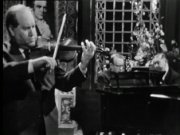
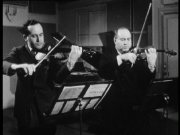
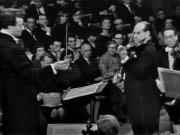
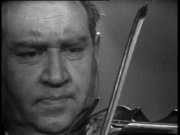
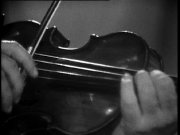
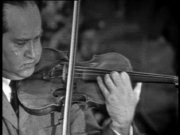
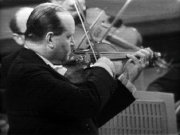
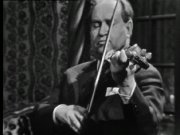
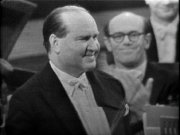









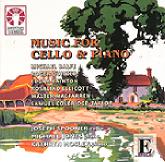


























Your Opinions and Comments
Be the first to post a comment!